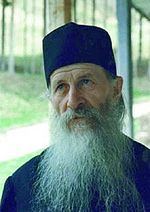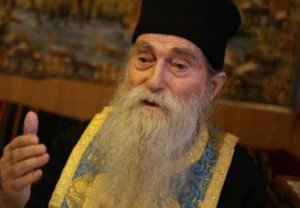God is Where There is Humility. From the
spiritual instructions of Elder Arsenie (Papacioc)
Archimandrite Arsenie (Papacioc), was one of
the oldest and most respected of the elders still living in Romania. He was a
representative of that golden pleiade of Romanian spiritual fathers of the
twentieth century who have no equal in their fervency of faith, and experience
in asceticism in the austere conditions of an uninhabited desert. He is like an
abba of the ancient patericons, possessing experience combined with spiritual
wisdom, a refined understanding of the secrets of the human soul, and a
remarkable literary gift. Elder Arsenie labored in asceticism in the
impenetrable forests of the Romanian mountains, together with Fr. Cleopa (Ilie),
was persecuted by the god-hating authorities, and was imprisoned for his faith.
He was the father-confessor of the monastery of St. Mary in Tekigroul, near
Constanci. The wise Romanian elder, who would have turned 97 on August 11, 2011,
reposed in the Lord on July 19, 2011.
The following questions were asked of the elder by Archimandrite
Ioannichie (Balan; 1930–2007)—a talented spiritual writer and poet, author of
the Romanian Patericon, and co-ascetic and biographer of Elder Cleopa
(Ilie).
* * *
 |
| Elder Arsenie
(Papacioc) |
—Fr. Arsenie, tell us, how can we be
saved from our many earthly cares, so that we might have more time for
prayer?
—Fr. Ioannichie, pure prayer from the heart and lips to God is a great work!
Prayer is a sharp arrow that all the saints have aimed at heaven for thousands
of years, and not only they, but also the simplest Christians. Prayer has
pierced the heart of the heavens, perhaps it has reached those who were
displeased with the earth's inhabitants, and salvific replies have returned
along the same path; thus was faith preserved on earth from generation to
generation.
Brother Christian, you also have your own history: you have entered into the
great Christian union—the Church—and are forever redeemed by the Savior's
sacrifice. That means that you are of great worth, and you have a great and
noble responsibility. Is it so difficult for each of us to simply and directly
ask God to help us in our troubles and sufferings, and to thank Him?!
Where is the man who has nothing to ask of our Lord Jesus Christ and the
Mother of God? They say that the Mother of God is offended by those who never
ask her for anything! She is the prayerful intercessor for people; and as much
as God can do through His power, so much can the Mother of God do by Her prayer.
Show that you are the child of the Mother of God, having a child's heart in your
breast!
And we can be free of earthly cares only if we want to be—after all, our
salvation depends upon us. As souls given by God, we must show more will, in
order not to immerse ourselves in these earthly cares and burden ourselves with
them to such an extent. We shall manage our lives as people of higher thought,
and as responsible human beings. If we were to ask those who are saved and
living in heaven, "What did it cost you to attain such blessedness?" they would
reply, "Time, a little time well spent on the earth!" That means that we have
absolutely no other time to bring our souls to perfection—souls that are called,
gifted, and full of such resolve.
We must think about the fact that we are called "the angelic ranks" [the
monastic rank is called the angelic rank. –OC]. Angels pray unceasingly,
throughout eternity.
—What is the easiest way to overcome in the struggle against fornication
and fleshly thoughts?
—In order to overcome in the struggle against fornication, in whatever stage
it may be, we must first of all ask for grace from the Good God. This is not a
short term battle, because we must definitely achieve total victory. At first,
each one sees that he is powerless to withstand it; but with God all things are
possible.
He who enters into this struggle must:
–want to be freed of this struggle, no matter what happens;
–pray with all his heart to the Mother of God, and ask her help;
–avoid, as much as possible, all circumstances that might arouse passions;
–do not accept into your mind those suggestions that might seem innocent, but
then begin to solidify into images. Route all these thoughts, changing your mind
to prayer—but your own prayer, and not something someone else recommended, no
matter who that might be; into prayer with your own sighing, even if it is
without words.
If the attack is aggressive, pleasurable, and vanquishing, one must call out
to the Mother of God, and not give in. During the first phases, he should
confess contritely and purely, not sparing himself and not blaming incidents,
circumstances, or other individuals. He will be greatly helped if he goes to
confession often.
 |
| Fr. Ioannichie
(Balan) |
The father-confessor will understand
him, console him, and assure him that he is not alone, yet not allow him to
harden in his motivations, as if it were all "necessary and perfectly natural."
The father-confessor should have zeal and kindness in order to be able to
tear his spiritual child away from this secret and many-headed passion. It is
recommended to read books and everything that has as its goal the preparation
for death. The lost one will be forgiven through repentance, no matter what sin
he committed, and this will be a great achievement; but let no one deceive
himself or suppose that he can find any forgiveness without repentance. Because
of this sin, you cannot ever know what heaven and hell really are; and one
should think about this and pray.
A person who is more spiritually inclined, but nevertheless gets wounded to a
greater or lesser extent and then passes through the bath of repentance, counts
this as a misfortunate accident. He will have a serious reason for truly meek
humility—and this gives God more joy than when someone thinks highly of himself
as never having fallen.
This is not a paradox, but divine justice and mercy. He, the Master of the
house and Good Pastor, left his sheepfold of sheep and went to find the lost
sheep, and then happily put it on His shoulders and carried it into the gates of
the Kingdom of glory. I once read what I am telling you now: "Brother Christian,
believe me, there are two kinds of joy, which cannot be combined—you cannot
rejoice here on earth in pleasures that are transient and sinful, and then reign
with Jesus Christ." "Then, iniquity will stop its mouth" (cf. Ps. 106:42). "Thou
fool, the time that you use for evil digs a pit for you, and tomorrow eternity
will come!" Saying this, I think that the father confessor can encourage the
person who is struggling with onslaughts from without, and with nature from
within.
—How can one conquer and route ambition and prideful thoughts from
himself?
—A hideous and impure passion! All evil catches a fish in this murky water!
God does not even want to hear about a proud person! He takes all grace away
from him, so that he might stumble—maybe then he will become humble, as the
Scripture says (cf. 1 Pet. 5:5).
He abandons him, and that person becomes a great abomination; He takes from
him all sense of beauty, leaves him to roam around in chaos, in all manner of
filthy back alleys of the world. He has no image, or likeness, or healthy
reason. The holy fathers say truly, "Wherever there was a fall, pride first did
its work."
No other passion will liken you to a devil like pride.
All passions can, let's say, be excused due
to nature and bad life circumstances; but pride cannot be justified by anything!
It has an unbearable insolence—it attaches itself to any virtue if it can, and
it even hides behind humility, which serves as its shield. We see this very
often, and to prove what I am saying, it is as one father said: "That proud one
is so humble!"
Because it is so dangerous and so broadly present in all ages and ranks, it
would be good if no one would disdain any person, no matter how unimportant he
may be—for Christ is within him—and would even ask his opinion, even if it is
for a lark. This would be the first step, one length along the path of the
Gospels.
It would be good to ask everyone's opinion, no matter who you are; for who
knows? After all, God's grace rests more often upon the simple and unnoticed.
Make a prostration, as they say, if only for the sake of humbling the body—for
this also shows good manners—and you will see how much you need these people
with whom God has assigned you to live. You will see, and will be convinced in
life that wisdom really does abide more in places where there is humility—for
God is there.
Lucifer fell irreparably; his grandiose fall happened due to one word only:
"I". Having fallen, he became an adversary for eternity, an abomination of
desolation. Let no one be deceived, thinking that without true purification in
the only water of humility he can enter into the Kingdom from which the angels
fell!
These are, in brief, my thoughts and exhortations about this, so that one
might realize that God created us beautiful only for Himself!
—What can one do to restrain the tongue and acquire the gift of
silence?
—This is truly a serious matter—to not be the master of your tongue. As the
saints say, "The tongue leads us to great falls." More vanity than benefit comes
from loquacity, and malignant gossip brings great danger not only in this world,
but also in the next. They say that most of the people in hell are those who
murdered with malicious words!
Brother, you must love you brother. Isn't this the Savior's most important
commandment? He gave this commandment as the crown of all His teachings—that the
only way to salvation is love; and He ascended the unforgettable and
soul-rending Golgotha!
We must always reiterate to people the responsibility that we bear for our
lifetime, the only time given to us, so that we would set a lock upon our tongue
and purify our hearts from evil. St. Gregory the Theologian says: "We must
answer for every superfluous word, even more so for every shameful word"; how
much more horribly for every murderous word! The
Patericon is very useful
in this regard with its chapter on "The benefit of silence."
St. Isidore of Pelusium says, "Speaking with benefit is a blessing, but if it
is reinforced by deeds, it is crowned." "For life without words brings greater
benefit, while a commanding word evokes anger. If word and life are united they
comprise the personification of all philosophy."
Treasure the Lord in your heart and let your attention abide there, and
remain there before the Lord without leaving. Then you will notice every speck
of dust in yourself. This is how mystical knowledge begins. It is a mirror for
the mind and a lamp for the conscience. It dries up lust, extinguishes rage,
humbles anger and disperses sorrow, tames insolence, scatters despondency, gives
clarity to the mind, casts out sloth, truly humbles you and makes your reason
undeceivable; it wounds the demons, and purifies the body. Such a person is no
longer the participant in any wicked deed, but rather is alien to it. He thinks
all the time, "Who shall I go to? I am a worm…" This is something different,
having to do with remembrance of death and man's eternal lot, and belongs to
mystical knowledge.
From: Ne vorbeşte părintele Arsenie. Ediţia
îngrijită de а Arhimandrit Ioanichie Bălan. Vol. 1–3. Editura Mănăstirea
Sihăstria, 2004.
02 / 08 /
2011
source


